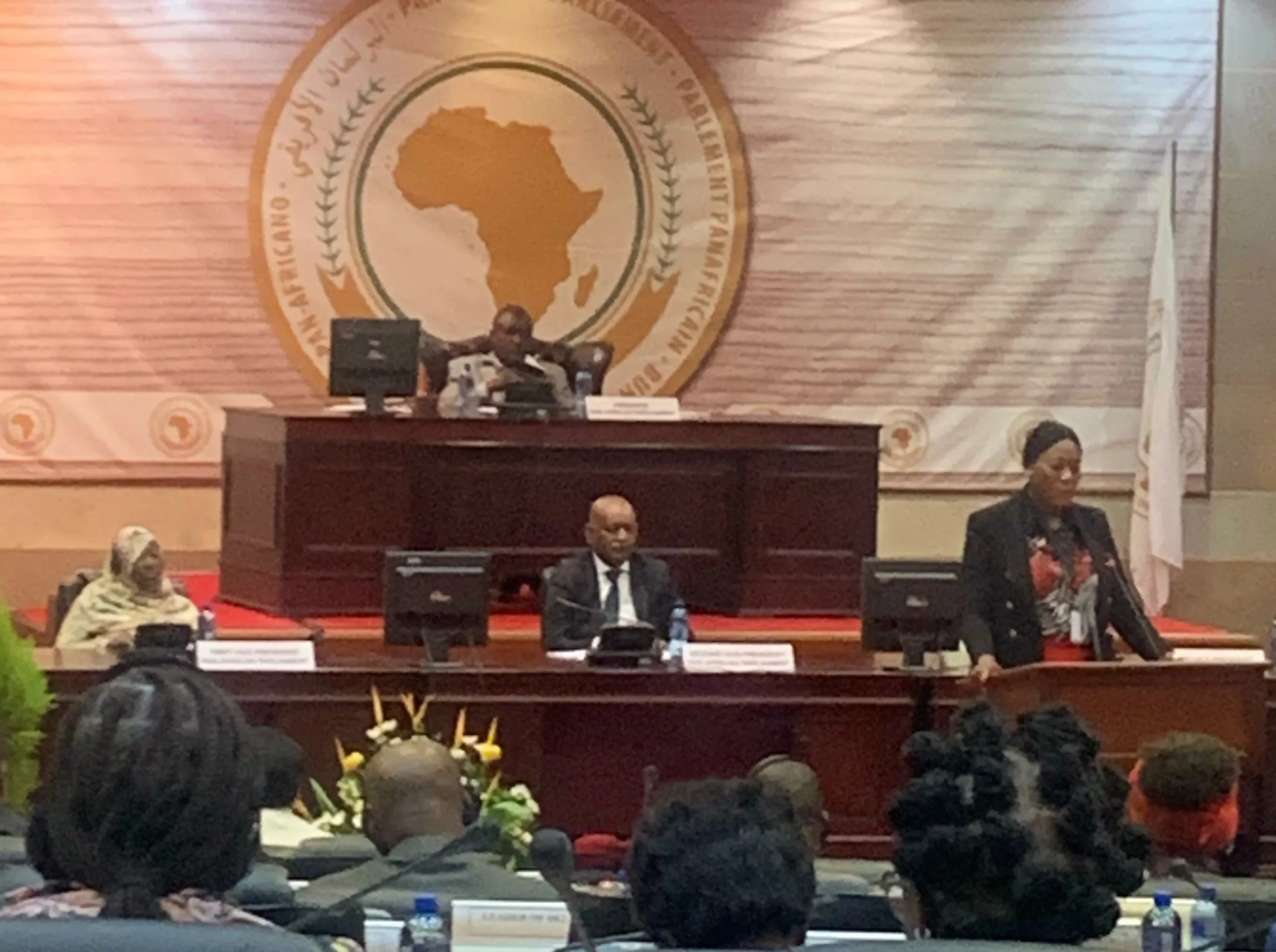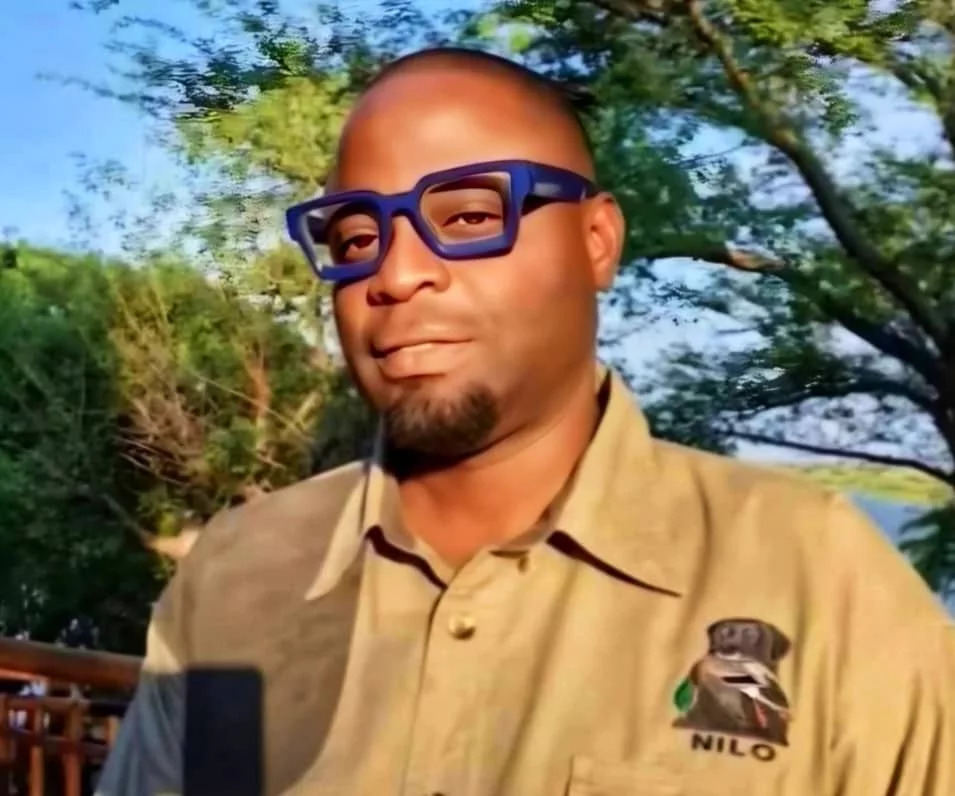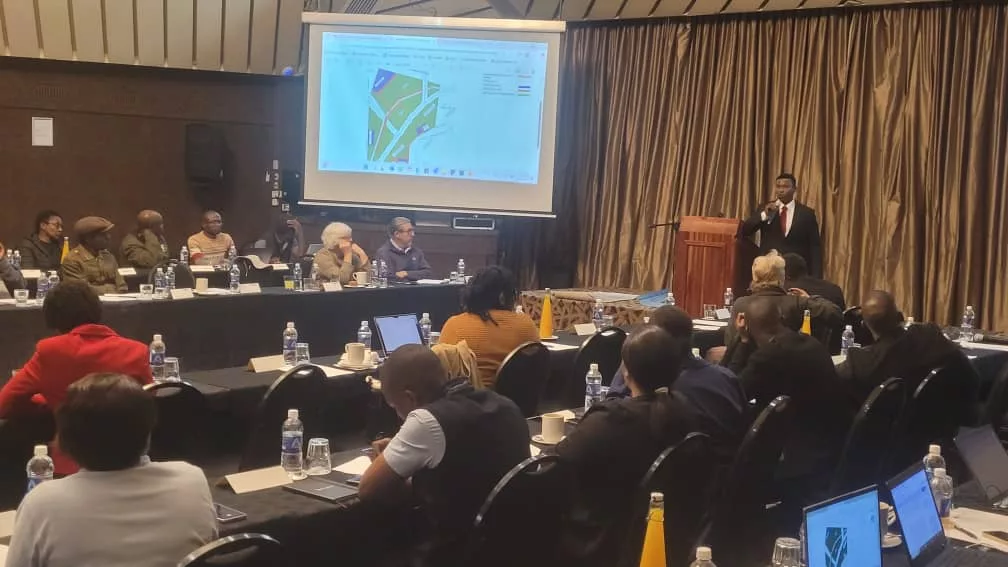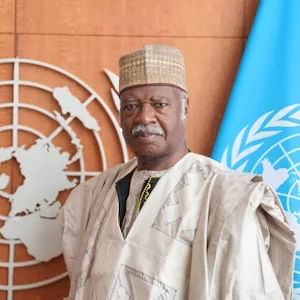|
Getting your Trinity Audio player ready...
|
The African Commission on Human and Peoples’ Rights (ACHPR), the African Committee of Experts on the Rights and Welfare of the Child (ACERWC), and the African Peer Review Mechanism (APRM) have expressed solidarity in working with the Pan African Parliament (PAP) to foster sustainable development on the continent.
In a solidarity message during the official opening of the Fourth Ordinary Session of the Permanent Committees of the PAP Sixth Parliament, Hon Remy Ngoy Lumbu, the President of the African Commission on Human and Peoples’ Rights, said the two institutions share the mandate of promoting and protecting human and peoples’ rights on the continent.
Speaking on the same occasion, HE Ambassador Marie-Antoinette Rose Quatre, the Chief Executive Officer of the African Peer Review Mechanism (APRM) Continental Secretariat said her institution will collaborate with the PAP to diagnose governance challenges on the continent and to facilitate the development of standards needed to achieve policy convergence and accelerate regional integration.
The APRM, in its 22nd year, has evolved beyond the diagnostic tool for the Union. The Mechanism which has through the years engaged citizens on various governance issues, has demonstrated that it has a unique potential to prevent conflicts and serve as an early warning diagnostic tool. The APRM has also demonstrated that it can also serve as a post-conflict reconstruction mechanism that promotes and restores constitutionalism and democracy.
“Working together, PAP and the APRM can contribute significantly to prevent wars and protracted instability that exact a huge cost in terms of human life and socio-economic progress. I call on all of us to help create and protect spaces where diversity, cohesion, and progress manifest as the cornerstone of our societies,
“Africa is facing unprecedented challenges from rapid and drastic shifts in the post-second world war world order. As Africans, our concerns should go beyond the debates on a unipolar, bipolar, or multi-polar world. We must necessarily focus on how we can best come together and chart our path forward to ensure that Africa emerges as a strategic global player from a position of our interest and agency,” HE Quatre said.
To achieve this, she said there is a need to recognise that Africa is too well endowed with natural resources to be poor. Africa also has the most youthful population with almost 1 billion people below the age of 35. This means that once critical skills in this population are developed, Africa will easily become the future innovation and productive centre of the world. The growing incomes in this demographic would also make Africa one of the biggest markets of the future.
Key to the attainment of this goal is democratic governance, yet an Afrobarometer report of August 2024 indicates that although African youth prefer democracy to any kind of authoritarian alternative, they are more likely than their elders to be dissatisfied with the way democracy works in their countries.
“Therefore, PAP and the APRM need to reflect seriously on these views. We must work together to address the challenges which in many ways add to such public dissatisfaction and conflict on our continent.
“For our part, I am working towards getting the Africa Governance Architecture and the APRM to consider the theme ‘Youth and Governance in Africa: Towards Global Leadership’ as the theme for AGR 2027. It is my conviction that such a report would serve as the blueprint diagnosis of the governance challenges and opportunities youths face and can harness respectively. Such a report would better inform your excellencies, policymakers, and politicians of the choices we need to make to address the persistent and unaddressed challenges facing our youth. I invite PAP to support this agenda and to work together with us on this endeavour.”
In his Solidarity Message, Hon. Wilson Adão, Chairperson of the ACERWC, said reparations are not solely about acknowledging the past; they are about ensuring that children inherit a future characterized by equity, dignity, and opportunity.
“As we reflect on this theme, let us be reminded that healing the wounds of our past is not just the right thing to do—it is also an important step in building strong and inclusive communities. By facing these past wrongs, we make real changes that support our children and build a hopeful future, so every child can grow up in a good environment, enjoying their rights enshrined in the African Charter on the Rights and Welfare of the Child.
“The impacts of these historical injustices are also reflected in the ongoing humanitarian crises and conflicts across our continent. Africa has frequently experienced prolonged conflicts and emergencies that devastate communities and especially impede the effective realisation of children’s rights. Civil wars, cross-border disputes, insurgencies, and terrorist activities have all contributed to a breakdown of traditional protection systems at family, community, and national levels. Places such as Sudan, the Eastern Democratic Republic of Congo, Northern Mozambique, and the Sahel have suffered the tragic consequences of such conflicts—where children are not only the victims of abuses but are also forcibly recruited into armed forces and armed groups,” Hon Adao said.
He added that the lived realities of children in conflict situations compel stakeholders to urgently pursue comprehensive reparatory justice that addresses the root causes of instability while protecting children.
He said the Pan African Parliament plays an important role in advancing the rights of children and in driving the legislative reforms essential for collective progress.
“As a place where the voices of Africans are heard, the Pan African Parliament champions policies that promote social justice, accountability, and unity. In line with this year’s AU theme, the Pan African Parliament can also help correct past wrongs by supporting actions that offer reparations and build fairer societies.
“By fostering dialogue among member states and coordinating legislative oversight, the Pan African Parliament not only addresses the legacies of historical injustices but also lays the foundation for a more resilient and equitable Africa.”
In recognition of the similar mandates of the Pan African Parliament and the ACERWC, the two organs have developed a fruitful collaboration. The Secretariat of the Committee has actively participated in seminars and joint meetings of the PAP Committees, particularly the Committee on Health, Labour, and Social Affairs, to raise awareness on pressing child rights issues. These engagements have been instrumental in encouraging parliamentarians to drive legislative change in issues affecting children on the continent.
At the close of 2024, colleagues from both the ACERWC Secretariat and the Pan African Parliament convened for a technical collaborative engagement in Maseru, the Kingdom of Lesotho. The meeting served to enhance mutual understanding of the institutions’ mandates, identify areas of convergence, and concretise potential initiatives aimed at advancing the rights of the child.
The ACERWC and the Pan African Parliament will be signing a Memorandum of Understanding on the 7th of April 2025, during the 45th Ordinary Session of the ACERWC. A detailed roadmap is already in place to ensure the effective implementation of our collaboration once the MOU is signed.
By addressing the challenges born of historical injustice and ongoing conflict—and by leveraging the essential role of the Pan-African Parliament a future where every child grows in an Africa fit for children will be built.






